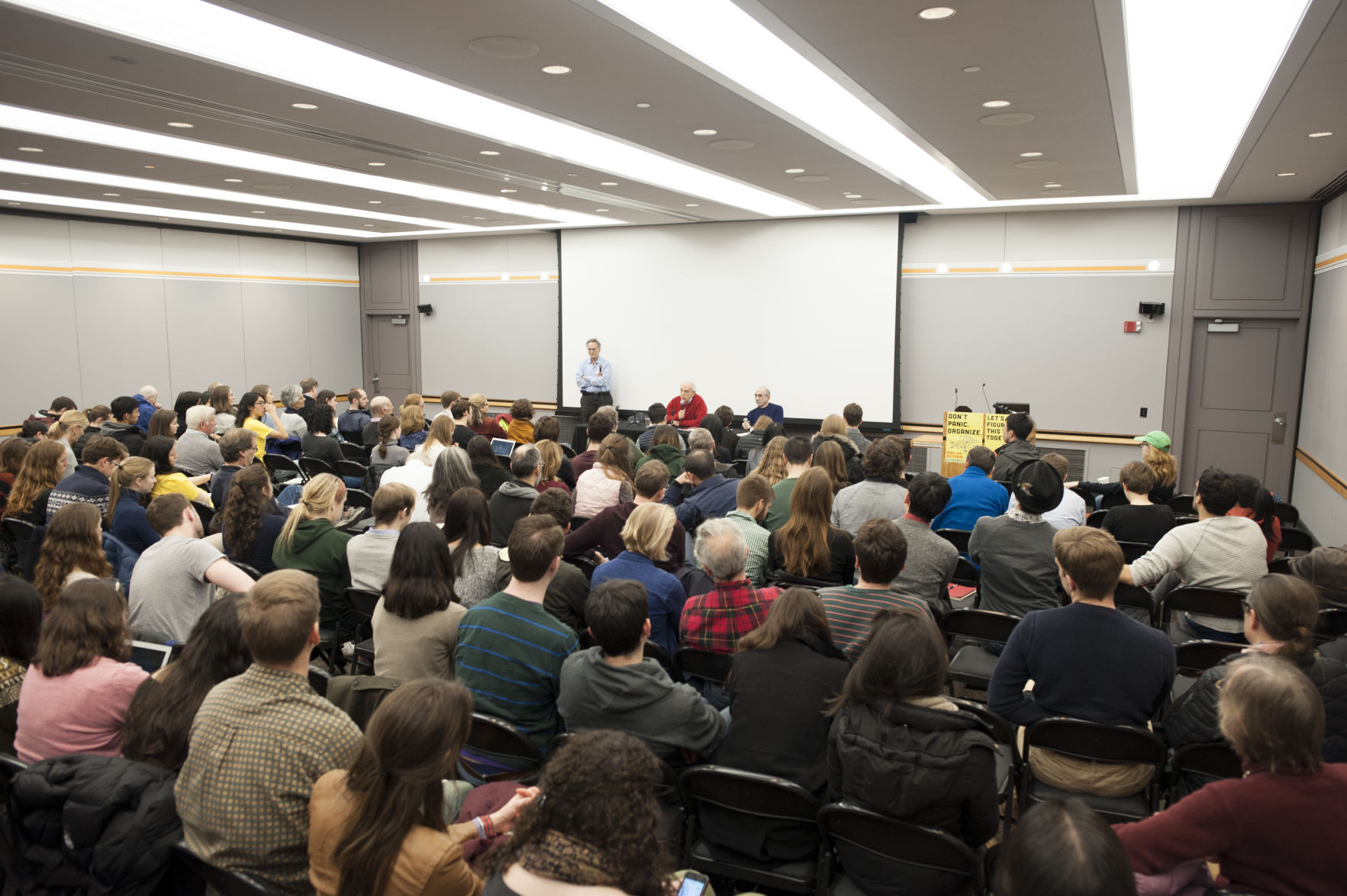By Ethan Sterenfeld, Correspondent
At least five hundred students, professors, and Princeton residents attended a “Day of Action” Monday at Princeton University, featuring more than 60 lectures and discussions about academic and political issues that might be affected by President Donald Trump’s administration., The organizers of the event, Princeton Citizen Scientists and Princeton Advocates for Justice, called the event “an unprecedented mobilization to put regular activities aside” on a campus that is often hesitant to engage with political controversy., “We’re trying to start the conversation about the problems facing our country and to reaffirm our commitment to the values of diversity, inclusion and equality that this university is all about,” said Nicholas Wu, a Princeton undergraduate junior and the leader of Princeton Advocates for Justice., “Something central to PAJ’s mission is connecting people with ways to get involved and ways to make a difference,” said Wu. “That’s really what the day of action was all about. It was about learning, discussing and figuring out what comes next.”, A diverse array of undergraduate and graduate students, university professors, and Princeton residents came to learn about topics including health care, racism, the gender gap in academia and organizing for activism., Patti Swartz, of Princeton, went to lectures on climate change and President Trump’s proposed border wall. She said she wanted to discover ways to counteract what she considered a “difficult administration.”, “I’m a concerned citizen who lives in Princeton,” Swartz said. “I would like to become a little more involved with the community, and this is my way of trying to learn a little bit more.”, Sina Wachenfeld, of Princeton, said it was reassuring to see that not all Americans supported Trump’s actions. She moved here from Germany last week, and the news coverage there had left her with a very negative impression of President Trump and his actions., “It’s lovely to see that when you arrive here in my neighborhood, people put out signs saying, ‘Wherever you are from, you are our neighbors,’” she said. “That’s a good sign for us immigrants.”, The Day of Action appeared on Wachenfeld’s Facebook feed over the weekend, and she decided to attend, even as she fought off lingering jet lag., “It’s exciting what you did here,” she said. “I like the model: ‘Don’t panic, just talk, and let’s discuss and see what the situation is.’”, Many of the sessions at the event resembled college seminars. Whoever lead the course would give an introductory speech, then attendees would discuss the problem at hand and its possible solutions in small groups, before finally reporting their ideas to the entire room at the end., Rebecca Ngu, a Princeton student, attended sessions on the legacy of colonialism in today’s America and the ways in which art can influence or support activism. She was glad that so many people came to the event., “It’s important to make a statement to ourselves and Princeton and the larger community that we care about these issues, that these issues directly affect our lives, and also acknowledge the work that so many people have already been doing,” the first-year undergraduate said., Some attendees noted the stark difference between the mass action of the day and the university’s reputation as being less politically active than other schools. Conrad Person recalled that stereotype from his time as a student at the university in the seventies, and said he saw Monday’s event as a promising development., “I think this is something that students can do better than almost anyone else,” Person said. “When you’re a student, you’re likely to have a relationship with a broader range of people.”, Person happened to be in the area Monday, so he decided to visit his alma mater, and he saw flyers around campus advertising the Day of Action. The central location of the event made it efficient to draw a large crowd, he said., The organizers reserved the Frist Campus Center – a well-traveled building in the heart of Princeton’s campus with lounges, study spaces, and a cafeteria – for 12 hours. In addition to the lectures and discussions, many organizations set up booths in the main area of the building to give out information about their causes., Representatives of the Pace Center for Civic Engagement, the department in charge of coordinating service at Princeton University, talked with people during the day about ways to extend activism through service., “One thing that I hope comes out of today is people recognizing that this work is not a short-term thing. This work involves lots of people coming together, coalitions forming,” said Eliza Blades, program coordinator at the Pace Center. “You’re going to have people who are interested in different issues, and have different interests and goals, but how can they be in alignment to have a shared goal?”, Lisa Lin, a Princeton University graduate student of electrical engineering, represented the Graduate Women in Science and Engineering group at the Day of Action. Lin worried that President Trump might damage efforts to close the gender gap in scientific fields., “We’ve seen a lot of behaviors from him that seem harmful to women in general, and obviously that’s an issue that we care about deeply,” she said. “We’re trying to advocate for women scientists and trying to increase representation of women in different STEM fields.”, One recurring theme throughout the day was a willingness to confront serious issues facing Americans. Tali Anisfeld, a first-year undergraduate at the University, was excited that people seemed willing to have difficult discussions after she attended a session on anti-Islamic bigotry., “There are a lot of conversations going on on campus that are not about the issues people are really itching to talk about,” Anisfeld said. “At this conference, all these issues are being broken open all at once.”

